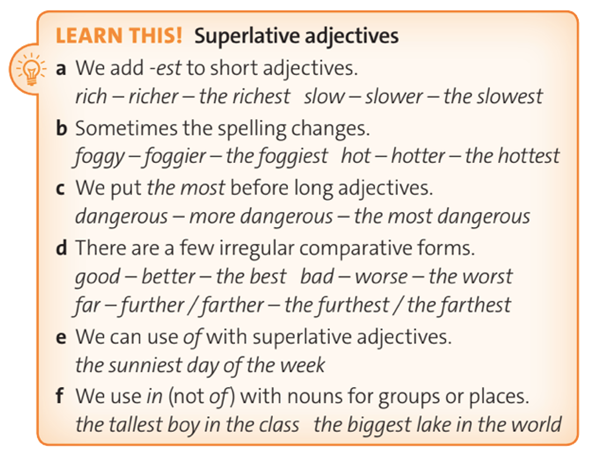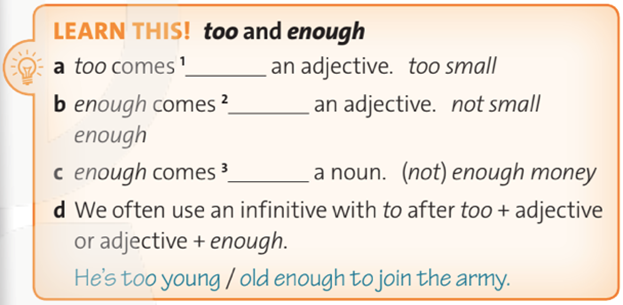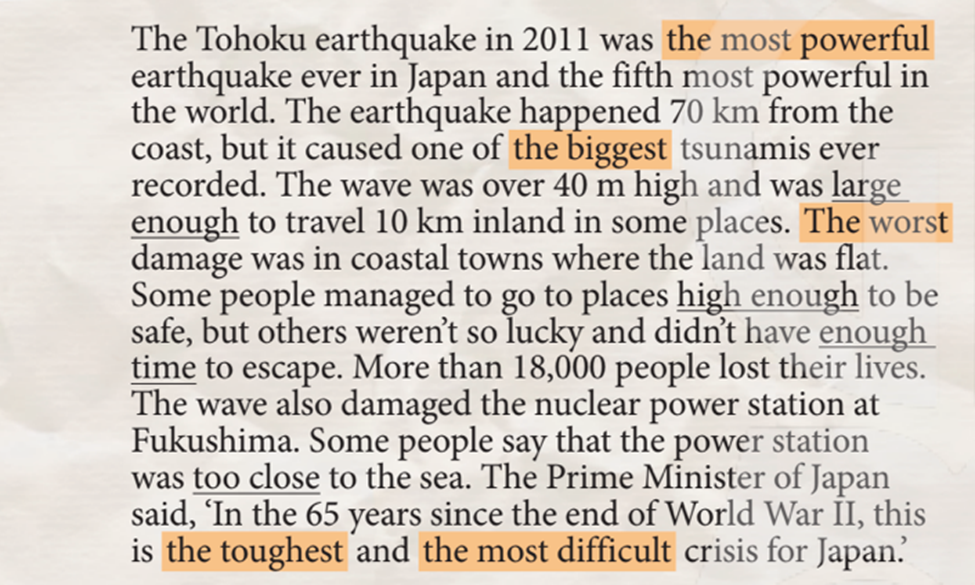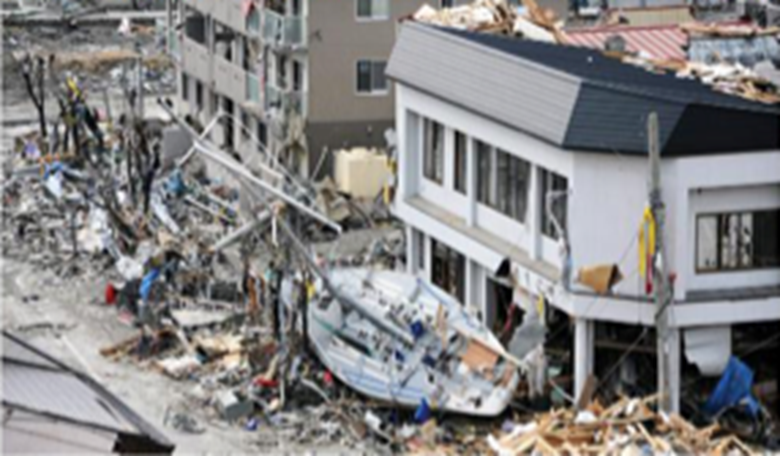Câu hỏi:
28/06/2024 67
Read the Learn this! Box. Then study the highlighted superlarative forms in the text and match them with the rules. (Đọc bảng Learn this. Sau đó nghiên cứu các dạng so sánh nhất được in đậm và nối chúng với quy tắc)

Read the Learn this! Box. Then study the highlighted superlarative forms in the text and match them with the rules. (Đọc bảng Learn this. Sau đó nghiên cứu các dạng so sánh nhất được in đậm và nối chúng với quy tắc)

Trả lời:
 Giải bởi Vietjack
Giải bởi Vietjack
Hướng dẫn dịch: Tính từ so sánh nhất
a. Ta thêm đuôi -est vào sau tính từ ngắn.
- rich – richer – the richest (giàu), slow – slower – the slowest (chậm)
b. Đôi khi sẽ có thay đổi về cách viết.
- foggy – foggier – the foggiest (sương mù), hot – hotter – the hottest (nóng)
c. Ta dùng the most trước các tính từ dài.
Dangerous – more dangerous – the most dangerous (nguy hiểm)
d. Có một số tính từ bất quy tắc.
- good – better – the best (tốt)
- bad – worse – worst (tệ)
- far – further / farther – the furthiest / the farthiest (xa)
e. Ta có thể dùng of với tính từ so sánh nhất.
- the sunniest day of the week. (ngày nắng nhất của tuần)
f. Ta dùng in (không phải of) với các dnh từ chỉ nhóm và nơi chốn.
- the tallest boy in the class. (cậu bé cao nhất trong lớp)
- the biggest lake in the world. (hồ nước lớn nhấ trên thế giới)
Đáp án:
(a) the toughest, the biggest
(b) the biggest
(c) the most beautiful, the most difficult
(d) the worst
Hướng dẫn dịch: Tính từ so sánh nhất
a. Ta thêm đuôi -est vào sau tính từ ngắn.
- rich – richer – the richest (giàu), slow – slower – the slowest (chậm)
b. Đôi khi sẽ có thay đổi về cách viết.
- foggy – foggier – the foggiest (sương mù), hot – hotter – the hottest (nóng)
c. Ta dùng the most trước các tính từ dài.
Dangerous – more dangerous – the most dangerous (nguy hiểm)
d. Có một số tính từ bất quy tắc.
- good – better – the best (tốt)
- bad – worse – worst (tệ)
- far – further / farther – the furthiest / the farthiest (xa)
e. Ta có thể dùng of với tính từ so sánh nhất.
- the sunniest day of the week. (ngày nắng nhất của tuần)
f. Ta dùng in (không phải of) với các dnh từ chỉ nhóm và nơi chốn.
- the tallest boy in the class. (cậu bé cao nhất trong lớp)
- the biggest lake in the world. (hồ nước lớn nhấ trên thế giới)
Đáp án:
(a) the toughest, the biggest
(b) the biggest
(c) the most beautiful, the most difficult
(d) the worst
CÂU HỎI HOT CÙNG CHỦ ĐỀ
Câu 1:
Study the undelined examples of too and enough in the text In exercise 2. Complete the Learn this! box with after and before. (Nghiên cứu các ví dụ về too và enough được gạch chân ở đoạn văn trong bài tập 2. Hoàn thành bảng Learn this với từ đứng trước và đúng sau)

Study the undelined examples of too and enough in the text In exercise 2. Complete the Learn this! box with after and before. (Nghiên cứu các ví dụ về too và enough được gạch chân ở đoạn văn trong bài tập 2. Hoàn thành bảng Learn this với từ đứng trước và đúng sau)

Câu 2:
Speaking. Work in pair. Ask and answer questions using the superlative form of the adjectives. (Nói. Làm việc theo cặp. Hỏi và trả lời các câu hỏi sử dụng tính từ so sánh nhất)
Speaking. Work in pair. Ask and answer questions using the superlative form of the adjectives. (Nói. Làm việc theo cặp. Hỏi và trả lời các câu hỏi sử dụng tính từ so sánh nhất)
Câu 3:
Rewrite the sentences using the adjectives in brackets and too or enough. (viết lại câu sử dụng các tính từ trong ngoặc cùng với too hoặc enough)
Rewrite the sentences using the adjectives in brackets and too or enough. (viết lại câu sử dụng các tính từ trong ngoặc cùng với too hoặc enough)
Câu 4:
Read the text and check your anser from exercise 1. (Đọc đoạn văn và kiểm tra đáp án của bạn ở bài tập 1)

Read the text and check your anser from exercise 1. (Đọc đoạn văn và kiểm tra đáp án của bạn ở bài tập 1)

Câu 5:
Complete these earthquake facts usign the superlarative form of the adjectives in brackets. (Hoàn thành các sự thật về động đất dưới đây sử dụng dạng so sánh nhất của các tính từ trong ngoặc)
1. The largest (large) earthquake ever recorded was in Chile in 1960 (magnitude 9.5).
2. _______ (deadly) tsunami happened in 2004 in the Indian Ocean. Nearly 230,000 people died.
3. _______ (deep) earthquake recorded occurred 450 km below the surface of the Earth.
4. Antarctica is the continent with _______ (small) number of earthquakes.
5. The _______ (destructive) earthquake ever recorded was in 1960 in San Francisco.
Complete these earthquake facts usign the superlarative form of the adjectives in brackets. (Hoàn thành các sự thật về động đất dưới đây sử dụng dạng so sánh nhất của các tính từ trong ngoặc)
1. The largest (large) earthquake ever recorded was in Chile in 1960 (magnitude 9.5).
2. _______ (deadly) tsunami happened in 2004 in the Indian Ocean. Nearly 230,000 people died.
3. _______ (deep) earthquake recorded occurred 450 km below the surface of the Earth.
4. Antarctica is the continent with _______ (small) number of earthquakes.
5. The _______ (destructive) earthquake ever recorded was in 1960 in San Francisco.
Câu 6:
Speaking. Describe the photo. What do you think happened? Use the words below to help you. (Nói. Miêu tả bức tranh. Bạn nghĩ chuyện gì đã xảy ra? Sử dụng các từ dưới đây để giúp bạn)

Carry (mang vác)
Dry land (vùng đất khô cằn)
Leave (rời đi)
Lift (v) (cuốn đi)
Tsunami (sóng thần)
Wave (n) (sóng)
Speaking. Describe the photo. What do you think happened? Use the words below to help you. (Nói. Miêu tả bức tranh. Bạn nghĩ chuyện gì đã xảy ra? Sử dụng các từ dưới đây để giúp bạn)

Carry (mang vác)
Dry land (vùng đất khô cằn)
Leave (rời đi)
Lift (v) (cuốn đi)
Tsunami (sóng thần)
Wave (n) (sóng)


